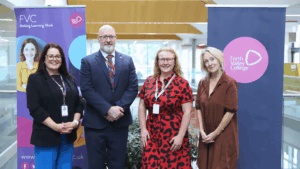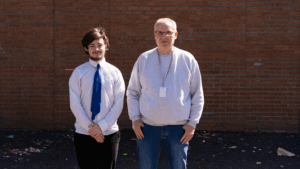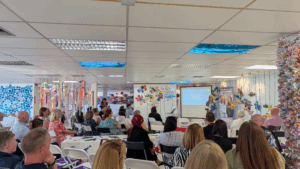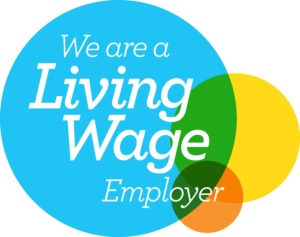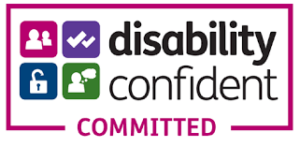As we celebrate our 10th year supporting young people, MCR Pathways have today announced our school leaver results. Sharing the profound impact our Young Glasgow Talent mentoring programme is having in Glasgow.
Where only 48.8% of care experienced young people in Glasgow went from school to employment, university or college 2 years ago, for MCR mentored young people in 10 of the city’s schools, the results announced are a transformational 82%. The stats on school leaver destinations which are routinely compiled by SDS (Skills Development Scotland) rise further to 93.2% when additional Scottish Government categories of positive destinations are included. These add in training and volunteering amongst others. Purposely, MCR focuses on employment, university and college as our definition of positive and sustainable destinations. The 61 mentored young people who left school in the summer achieved the 82% and have sustained their choices to now. This was also in sharp contrast to a 47.8% level achieved for care experienced in the same schools who were not mentored. The huge difference in mentoring is what is driving MCR Pathways to recruit thousands more volunteers to meet the demand and break the vicious cycle that our most disadvantaged young people experience.
The enthusiastic endorsement from the Council’s CEO and Leader in January to dedicate 10% of their 18,000-strong workforce is an indicator of how seriously the city is taking this. This commitment plus the additional volunteers being targeted will ensure MCR can achieve its plan to reach every disadvantaged and care experienced young person in Glasgow’s secondary schools.
At its heart MCR Pathways helps young people individually to find their own path. Our volunteer mentors meet with a young person for one hour every week at their school. The aim is to keep young people engaged in education instead of leaving school without a plan.
Glaswegian Iain MacRitchie founded MCR Pathways 10 years ago, working in one school for the first 5 years to develop a model that was effective for individuals but could scale citywide. The vision was simply for all young people to have equal access to opportunities, support and encouragement, whatever their background or circumstances. Ultimately closing the attainment gap and ensuring the same education outcomes, career choices and life chances.
“We are now on track to reach just over half of the city’s most disadvantaged young people to help them find, grow and use their talents through our mentoring and talent taster programmes. When our young people are supported over at least a year, the results are incredible. It is a very emotional experience to see the profound impact of a mentor who can spend the time each and every week. We need many thousands more volunteers and when we do we will slam shut the attainment gap. There are so many committed people working to make this happen. When one person is mentored 2 lives are changed with the positive impact on the mentor and the organisation they work for. Everyone benefits,” Iain MacRitchie.
And MCR mentoring really works. Mentors and their mentees discuss options for the future, whether that be an apprenticeship, work experience, college or university.
Mentoring keeps young people engaged with education. Comparisons held in 2015/16 between mentored and non-mentored young people, revealed a return to school rate for S5 mentored young people to be 87%, against 31% of non-mentored pupils.
The results just published for 2016 demonstrate the profound and transformational impact that MCR mentoring is having with the 82% of mentored young people going onto further or higher education and employment. The number for Glasgow in this measure of 48.8% compares to a national average of 51%. Glasgow and MCR young people are now smashing the long-term trend and overcoming disadvantages they suffer through no fault of their own.
While he’s delighted with the progress being made, Iain MacRitchie has ambitious plans.
“The programme now runs in 15 Glasgow secondary schools and will be rolled out throughout all the city’s 30 secondary schools. There are currently almost 400 volunteer mentors, who come from all walks of life. The plan is to increase that number to 1,000 and then press on for many more.
Glasgow City Council’s commitment of 10% of the workforce to become MCR volunteer mentors is a major precedent. We are confident that it will be the first of many commitments from some of Glasgow’s most prestigious institutions and businesses. Whilst the stats on the impact will drive policy, it is the stories and experiences of the young people that really matter and drive everything we do. It’s not about university or any one aspect, it’s about the young person’s talent and giving it the opportunity.”
Here we speak to MCR Mentor Mairi Damer, 52, from Glasgow and her mentee Simone, 18, about their relationship.
Former broadcast journalist Mairi runs her own company, Word Up Communications. She mentored Simone at Springburn Academy, supporting her through the crucial period of exams and planning her future. Simone had disengaged from school and had no confidence. Very little sparked her interest and her attendance was at best sporadic. It looked like she would leave school with no plan for her future. Simone’s personal life was also unsettled. As one of the middle of eight children, Simone often helped out around the house with her younger siblings.
Having a mentor gave Simone time for herself, and a focus. Their weekly hour long sessions focused on improving Simone’s school attendance, and Mairi also noticed Simone’s passion and talent for art.
Their journey was bumpy at times, but with Mairi’s support and encouragement, Simone managed to get through school and was accepted on a Fine Art course at City of Glasgow College.
Mairi said, “As a teenager I didn’t really have a solid adult role model. I wanted to have someone special for me. Someone to give me the guidance I didn’t always get from my family. I wanted to use my own experience to give someone else some support.”
Mairi and Simone met nearly two years ago, when Simone was 16. Although they were both nervous, they bonded over a love for David Bowie. On Mairi’s office wall there is a painting, which is Simone’s version of their idol.
Simone said, “School was never a good place but I’ve always liked art and I would draw anywhere I could. I never thought about doing anything else. Mairi mentioned art therapy, which I’d never heard off. It interested me and she helped me research it as a possible career.”
Mairi often spoke to Simone about taking things a step at a time.
Mairi said, “I explained to Simone if there is something you like, there’s a pathway you can follow, but you can take it a step at a time. Eventually you might take another path away from your original path but you’ve got to start with that first step.”
At school, Simone struggled with confidence and didn’t have that many friends, but college is a different experience.
She said. “College is great because I didn’t think I would get in. I didn’t think I would get this far. I’ve met new friends. I thought college would be like school, where people don’t talk much, but the whole class is friendly. We’re close and when it was my 18th birthday, even people I didn’t know very well gave me a present.”
Mairi said, “Although Simone was very nervous about meeting new people, I knew if she came to college to study art she would find like-minded people, because that’s what happened for me.”
During their mentoring sessions, it wasn’t all plain sailing, as Mairi would sometimes be frustrated by Simone’s poor attendance record. She would play good cop/bad cop, by giving Simone a verbal prod when she needed it, but always followed by a hug.
Mairi said, “Simone didn’t love school but I’d tell her that if she wanted do something she was interested in, she had to turn up. No boss will put up with you being absent or late..”
Simone said, “My main problem was attendance and Mairi would always give me a prod. She kept me on track. She reminded me if I didn’t turn up I wouldn’t get into college, and now after the new year, I was first person in my class.”
As well as offering emotional support, Mairi helped Simone with the practicalities of researching courses and completing application forms.
Mairi said, “Simone needed more support and teachers often don’t have the time to spend with individuals. You also need good relationships. We can all remember an inspiring teacher we had at school, but Simone struggled to make those connections and school wasn’t working for her.”
In addition to disengaging with school, at home Simone sometimes found life stressful and valued the calmness of her mentoring sessions.
Mairi said, “When I first met Simone things weren’t calm and it can be difficult to think about the future. We discussed making choices. Even if things aren’t calm around you, if you want something different, what do you need to do to make a different kind of life?”
“Simone was young to be facing these questions but I thought it was important to talk to Simone about the pathway into adulthood and to question – where do I want to go with my life and what do I want to get out of it?”
Home life is now calmer and Simone is the first in her family to go to college. Her mum and dad notice a difference in her.
Simone said, “My mum thinks it’s been beneficial, and when I told my dad, he was so chuffed. I never expected that reaction. My mum can see a change in me, because I open up more.”
With Simone now on her pathway to further education, their mentoring relationship will come to an end.
Mairi said, “This is the end of our formal relationship but I’m sure we’ll keep in touch with each other. This is where I step away, take a break and maybe start mentoring another young person, but for Simone it’s onwards and upwards. I see a big change in her. She used to be quite shut down and now she’ll consider everything. She’s more confident, not so worried, and willing to try things.”
Simone said, “This is where my wings spread. My future is opening up in layers, like an onion.”
As MCR Pathways looks for more mentors, Simone is a good example of the difference mentoring can make.
She said, “There’s people out there who really need it. They could be following their dream if they have a bit of help. I really needed it but I didn’t have the confidence to say it. It’s not hard, it’s just a prod and a hug when it’s needed, and that’s so important.”
We have so many more inspiring young people signing up for MCR Pathway’s help and to become part of Young Glasgow Talent. They need mentors to make a huge difference to their confidence, educational outcomes and future life chances. Can you help them? Find out more about becoming a mentor.
Can your organisation help? To become involved in our Talent Taster programme, alongside our partners such as City Building, The Herald and Wheatley Group, get involved.
Help us spread the word by letting your friends and family know how hugely rewarding mentoring can be!
